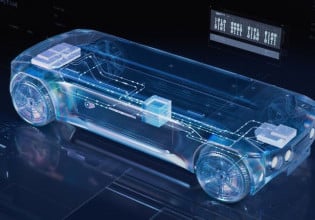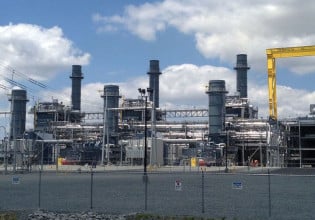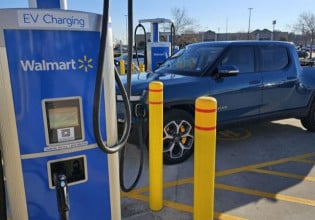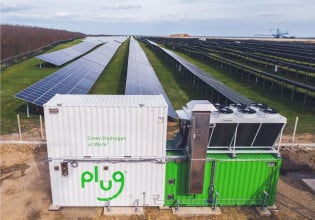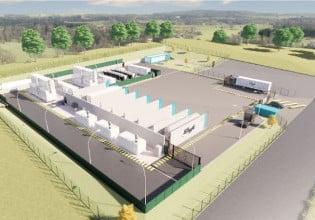EV Battery Recycling Players Secure Funding, Partnerships
The EV battery recycling market is on a roll with announcements, from funding rounds in the millions to corporate partnerships.
From funding rounds in the millions to corporate partnerships, the EV battery recycling market is on a roll with announcements. Here’s the latest.
Ascend Elements’ facility in Georgia recycles 30,000 metric tons of lithium-ion batteries and scrap annually. Image used courtesy of Ascend Elements
Startup Lands $542M to Fund Manufacturing Facility
Massachusetts-based Ascend Elements announced it raised $542 million in equity investments, including a $460 million Series D round led by the Qatar Investment Authority, Singaporean investor Temasek, and New York-based venture capital firm Decarbonization Partners, a joint venture between Temasek and BlackRock. The funding comes after the company received two U.S. Department of Energy grants last year totaling $480 million to build an industrial-scale production capacity of cathode materials from spent lithium-ion batteries.
Ascend Elements said it would use the new funding to build its first commercial-scale NMC cathode precursor (pCAM) and cathode active material (CAM) manufacturing plant. Spanning 140 acres in Kentucky, the 1 million-square-foot facility will be the first of its kind in North America, churning out enough pCAM for 750,000 EVs per year. Construction started last fall, and operations are expected to kick off in late 2024.
A rendering of Ascend Elements’ 1 million-square-foot manufacturing facility in Kentucky, starting operations in late 2024. Image used courtesy of Ascend Elements
Ascend’s CAM and pCAM are tailored for microstructure specifications in EV batteries. The company markets a specialized method to make sustainable pCAM and CAM from black mass. Its Hydro-to-Cathode direct precursor synthesis process eliminates several steps in conventional cathode manufacturing and boasts a recovery rate of up to 98 percent.
The company recently scored its first commercial-scale pCAM contract, a $1 billion supply deal starting in late 2024 with the option to expand to $5 billion. (The customer’s identity wasn’t disclosed, though Ascend did say it’s a major U.S. manufacturer.) Its other partners include Honda Motor Co., which penned an agreement earlier this year to establish a closed-loop supply chain for recycled materials like lithium, nickel, and cobalt. Ascend also landed a deal to supply up to 5,000 metric tons of recycled/recovered lithium carbonate annually to Koura Global, one of the largest fluoroproducts providers.
Video used courtesy of Ascend Elements
Ascend recently started production at its $50 million “Base 1” lithium-ion battery recycling facility in Georgia, one of the largest facilities of its kind in North America. The renewable energy-powered plant can process 30,000 metric tons of lithium-ion batteries and scrap annually, roughly equal to 70,000 EV batteries.
Altilium Bags $2.5M Investment
U.K.-based Altilium raised $2.57 million from SQM Lithium Ventures, the venture arm of Chilean chemical supplier Sociedad Quimica y Minera de Chile (SQM), one of the world’s largest lithium producers.
The funding will help scale up Altilium’s demonstration line at its Battery Recycling Technology Center in the U.K., where it produces battery-ready CAM from spent EV batteries. The company’s pilot line recovers critical battery metals from black mass waste.
Altilium plans to retrofit its existing solvent extraction and electrowinning (SX-EW) hydrometallurgical plant in central Bulgaria to recycle battery materials from over 24,000 EVs annually. The company is also building its first U.K. recycling plant in Teesside, northeast England. Scheduled for completion in 2025, the site will have an annual capacity to process 50,000 tonnes of black mass for batteries and produce 30,000 tonnes of CAM per year.
The company says its hydrometallurgical recycling process can recover over 95 percent of lithium, manganese, cobalt, and nickel. Beyond these materials, it also claims it can recover over 99 percent of graphite. Altilium is working on optimizing its process to yield high-purity graphite that can be reintroduced into the anode supply chain.
Altilium produces CAM from end-of-life EV battery scrap at its demonstration line in the U.K. Image used courtesy of Altilium
The new funding joins the over $6.5 million Altilium has received from U.K. government awards. It’s also working with Imperial College London on a research project to compare the electrochemical performance of recycled cathode materials with cathodes derived from mined raw materials.
Closed-Loop Battery Recycling Partnership
European chemical giant BASF, which markets advanced CAM for lithium-ion batteries, announced a new partnership to produce CAM from recycled metals in Michigan. The batteries will serve North American customers buying lithium-ion battery cells from Nanotech Energy, a California-based company providing graphene-based energy storage products. The partners said that feeding recycled metals into the production of new lithium-ion batteries can reduce their carbon footprint by 25% compared to sourcing primary metals from mines.
The pair will work with Nevada-based lithium-ion battery recycling firm American Battery Technology Company and TODA Advanced Materials, a Canadian manufacturer of specialized pCAM and metal hydroxide materials. ABTC will recycle battery scrap and other off-spec materials from Nanotech’s pilot system in California. Lithium, nickel, cobalt, manganese, and other battery-grade metals recovered by ABTC will then be used by BASF and TODA for new CAM and precursors.
Separately, Nanotech Energy is eyeing full-scale battery production as it enters the final stages of building its “Chico 2” facility in California. The 150-megawatt plant will launch in early 2024 with a daily capacity of 30,000 18650 cylindrical cells.





